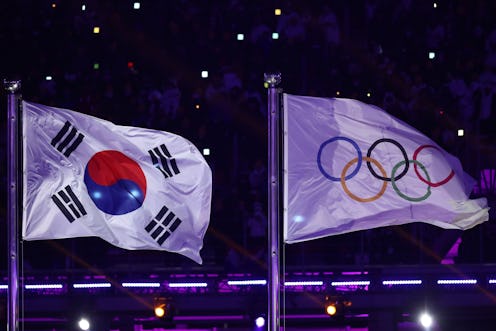News
There Was A Cyberattack At The Olympics & People Are Wondering If Russia Is Involved

At the opening ceremony of the Olympic Games in PyeongChang on Friday night, televisions and WiFi were knocked out. At the same time, the games' official website was reduced to its most basic functions. The International Olympic Committee (IOC) confirmed that there was a cyberattack at the Olympics opening ceremony. Officials declined to say who they thought was behind the attack, but speculation that Russia was involved was rampant.
The IOC banned Russia from participating last December over a doping scandal. Just 169 Russian athletes were invited to compete at the games, and they were required to march under the Olympic flag, with no national connections to Russia if they win, meaning playing of the country's national anthem and no medal attributed to Russia.
But despite the speculation that Russia could have been involved, IOC officials refrained from casting blame. Spokesperson Mark Adams focused only on "maintaining secure operations." He told reporters, "We are not going to comment on the issue. It is one we are dealing with. We are making sure our systems are secure and they are secure.”
He also dodged a question on whether organizers knew who was behind the attack. "I certainly don’t know. But best international practice says that you don’t talk about an attack," Adams added.
Russia, for its part, denied the allegations — in advance. “We know that Western media are planning pseudo-investigations on the theme of ‘Russian fingerprints’ in hacking attacks on information resources related to the hosting of the Winter Olympic Games in the Republic of Korea,” Russia’s foreign ministry said days before the opening ceremony. “Of course, no evidence will be presented to the world.”
Back in January, cyber security experts warned of evidence that Russian hackers were preparing an attack on the games; some sponsors even took the warnings serious enough to buy special insurance against it.
The local organizing committee assured that everything was back on track "All issues were resolved and recovered yesterday morning,” Pyeongchang organizing committee spokesman Sung Baik-you told reporters on Sunday.
He also seemed to acknowledge that officials did know where the attack had come from. “We know the cause of the problem but that kind of issues occurs frequently during the Games. We decided with the IOC, we are not going to reveal the source," Sung added. "We wouldn’t start giving you the details of an investigation before it is coming to an end, particularly if it was on security which, at these games, is incredibly important."
One other possible culprit is North Korea. The country has hackers that are famous for having targeted central banks and movie studios. It is thought that the hacking is the work of a nation state, given the resources involved.
Cyber security experts are not surprised that PyeongChang is a target. "It's got political importance. It's got a lot of money — that draws hackers like flies to a candle," cybersecurity expert Jim Lewis told CBS News. He said in the last several Olympics there were also attempted cyber attacks and hacks.
The general risk is so high that even the Department of Homeland Security warned American travelers headed to the games to beware of hacking on their mobile devices. They recommended that WiFi and Bluetooth be kept off when not in use, and to take care when connecting to open or public networks.
Japan has been vocal in its plans to protect the 2020 Summer Olympics in Tokyo from cyber attacks. The government has announced a 20 billion yen investment in training and response readiness by local and national authorities — even the military. They will also coordinate among private companies to ensure best practices are shared.
Cyber attacks at the Olympics may be here to stay, but countries can try to prepare to keep future opening ceremonies on track.